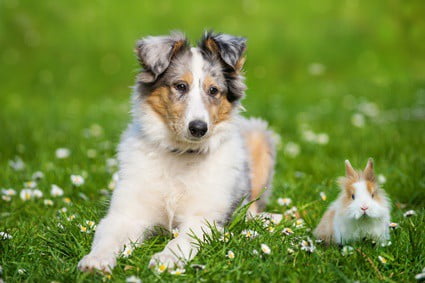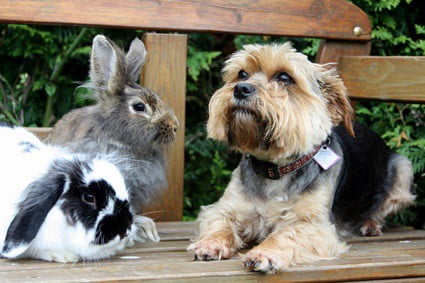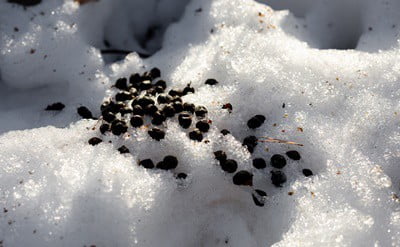Dogs will eat the most disgusting things, and that includes rabbit poop. While unpleasant, this behavior is common amongst canines. The technical term for it is coprophagia and is triggered by a number of factors.
Dogs will eat rabbit poop because they enjoy the taste and smell. It’s usually harmless, but parasites in rabbit feces can cause sickness and diarrhea. Sickness caused by rabbit feces can lead to kidney and liver problems if left untreated. If your dog is prone to eating rabbit poop, make sure there’s enough fiber and complex B-vitamins in its diet.
Most dog owners will want to discourage their pets from consuming rabbit feces. Fortunately, there are some effective training techniques that you can try to make this happen. Puppies or dogs with a compromised Immune system should stay away from rabbit droppings altogether.
Is Rabbit Poop Bad for Dogs?
There are two types of rabbit droppings. The first is normal fecal droppings, which are hard, round pellets of indigestible fiber. These are the fecal pellets you’re most likely to find in a rabbit’s hutch.
The second is cecotropes. These are dark brown, foul-smelling droppings that look like a bunch of grapes. You’re less likely to see these, as rabbits eat them to get essential nutrients into the body.
But are rabbit feces considered toxic? The good news is dogs are unlikely to be harmed by rabbit poop, especially if they’ve only consumed a small amount.
As rabbit poop is mostly undigested grass and hay, little damage is likely to occur after consumption. However, parasites in a rabbit’s feces can cause sickness – more on this below.
While most dogs won’t display any symptoms after eating rabbit poop, some might react to the parasites found in feces. After your dog has consumed poop, look out for the following:
- Diarrhea
- Abdominal pain
- Dehydration
If the symptoms appear severe or get worse over time, seek veterinary treatment.
Are There Parasites in Rabbit Poop?
Parasites are common in rabbit feces and can be passed onto dogs through the consumption of infected pellets. Not all rabbit droppings will be infected with harmful parasites, but it’s impossible to know until the dog displays symptoms. These are the most common parasites found in rabbit poop:
Coccidia
As described by VCA Hospitals, coccidiosis is an intestinal tract infection caused by a single-celled organism (a protozoan) called coccidia.
Veterinarians can determine whether or not a dog has consumed rabbit feces by the presence of coccidia in the stool. However, the rabbit form of coccidia doesn’t harm dogs. Instead, it passes through the intestinal tract and comes out through the feces.
If your dog develops gastric sensitivity or diarrhea after eating rabbit droppings, get it checked out because something else more sinister might be to blame.
Giardia
Giardia is a tiny parasite that causes giardiasis, which is a diarrheal illness. Once the parasite gets inside the dog’s system, it causes frothy, greasy, foul-smelling diarrhea. You may also see traces of mucus in the dog’s poop.
The disease isn’t usually fatal unless the dog’s immune system is young or weak. However, diarrhea caused by giardia must be treated as quickly as possible; otherwise, serious gastric inflammation, weight loss, or a severe lack of appetite can occur and make the canine extremely unwell.
Treatment for giardiasis varies, but infected dogs are usually given oral medication. All dog toys and bedding must be washed to remove traces of the parasite.

Leptospira
The MSD Veterinary Manual describes Leptospirosis as an infectious disease caused by a type of bacteria called Leptospira. Dogs are most commonly affected and can develop the disease after coming into contact with infected rabbit feces.
However, Leptospirosis is more easily transmitted through urine. If a rabbit urinates at the same time as defecating, Leptospirosis is more likely to work its way into a dog’s system.
Some dogs don’t show any signs of illness, while others develop the following:
- Fever
- Shivering
- Muscle tenderness
- Stiffness or reluctance to move
- Increased thirst
- Either frequent or reduced urination
- Dehydration
- Loss of appetite
- Jaundice
- Lethargy
- Painful inflammation of the eyes
Leptospirosis can be treated with antibiotics. However, if left untreated, the disease can lead to kidney or liver damage. Annual vaccinations are available and can protect dogs for up to 12 months.
Why Do Dogs Like Rabbit Poop?
For us, the thought of our dog eating rabbit poop is unsettling. But for canines, it makes a tasty treat. Even though feces is an unpleasant and smelly substance, rabbit droppings are mostly made up of undigested grass.
Some dogs enjoy the taste of poop and are drawn to the smell of the droppings. They make an exciting treat when discovered in the grass and dogs usually eat the feces before realizing what it is.
There are also several other reasons why a dog chooses to eat rabbit feces, including the following:
Nutritional Deficiencies
Dogs that lack fiber or B-complex vitamins in their diet are more likely to ingest rabbit poop to get these essential nutrients into their body.
While rabbits eat cecotropes, they leave their feces alone. This is because they already eat enough fiber through grass, hay, and alfalfa.
Rabbit poop also contains many digestive enzymes that come from a rabbit’s stomach. These enzymes aid with digestion, which many dogs on a kibble-only diet lack.
Therefore, you must feed your dog a diet rich in fiber and B vitamins to give it the nutrients its needs and prevent it from consuming rabbit droppings.
Curiosity
Your dog doesn’t need a nutritional deficiency as an excuse to eat rabbit feces. Dogs use their advanced sense of smell and taste to detect new and unfamiliar things. Eating gross things, like poop, is their way to ascertain what it is they have discovered.
As described by Frontiers in Veterinary Science, a canine’s ability to detect odors is reported to be as much as 10,000-100,000 times that of an average human.
They also have an extra smelling organ in their mouths called the Jacobsen’s organ. VCA Hospitals explains that this organ serves as a secondary olfactory system specifically designed for chemical communication. To put it simply, it picks up undetectable scents.
Unfortunately, this means that dogs often eat things that are bad for them before their owners get a chance to stop them.
Hunger
Dogs are driven by their basic instincts. One of these includes hunger. If your dog is hungry or greedy, it will eat anything that smells even remotely edible – including rabbit droppings.
Heading on walkies before your dog has had a meal with fuel this desire to eat. If your dog enjoys the taste of rabbit feces, it will seek droppings out more regularly as a tasty snack.
Pica
Pica is a condition that causes dogs to eat non-food substances. Coprophagy is the technical term for the consumption of feces and is one of the most common forms of pica.
Pica usually develops because of behavioral issues. However, some medical conditions, such as liver disease, parasites, and anemia, cause dogs to consume rabbit feces. Common reasons for pica include:
- Boredom
- Stress
- Anxiety
- Learned punishment
- Fear of punishment
As a compulsive condition, pica requires on-going treatment. Relapses are also common. The following steps can be taken to help prevent pica:
- Provide plenty of exercise and mental stimulation.
- Decrease boredom while the dog is at home with games and puzzles.
- Provide soft chew toys that your dog can’t swallow to distract it.
- Eliminate access to items your dog will eat.
If the problem persists, seek veterinary help for advice on how to treat your dog with alternative methods.
What Can I Do to Stop My Dog Eating Rabbit Poop?
The best way for your dog to avoid nasty parasites and infections from rabbit poop is to stop eating it. While easier said than done, there are plenty of techniques you can use to deter your pet from consuming the feces it finds, including the following:
Provide A Nutritious Diet
Each dog breed requires different nutrients to keep them strong and healthy, so get some advice on what your canine needs. Finding the right brand of dog food is essential – as is finding food that will keep your dog sustained.
Many dog owners choose a wet food diet, while some only food their dog dry kibble. Both are safe, but if your dog constantly seems hungry, try switching to a more fulfilling food.
Not only will your dog be less tempted to eat the rabbit droppings it finds, but it already has the nutrients it needs, reducing the need to consume them altogether.
Hide the Taste
You can stop your dog from eating rabbit poop every time you catch your pet about to do so. However, long term, it’s more effective to put your dog off eating the feces.
To do so, place something your dog hates the taste of on the rabbit droppings you find. This could be a hot sauce or something similar. Just make sure the food is safe for dogs to eat.
Your dog will begin to associate the horrible taste and smell with the rabbit feces and, as a result, will avoid poop completely. This learned behavior should break the habit, as your dog won’t want to risk eating something it doesn’t like.
Teach “Leave It”
If your dog doesn’t already know it, teach it to understand the command “leave it.” This is an effective way to stop your dog from eating rabbit feces.
To do so, first find an empty room with no distractions. Grab a tasty treat, and then show your dog what you’re holding to grab its attention. Allow your dog to have a sniff of the treat while keeping it covered and firmly say, “leave it.”
Once your dog stops sniffing, reward it with the treat. The next stage is to repeat the process while leaving your hand open. Every time your dog leaves the treat alone, reward it.
Practice this with other things around the house that you need your dog to leave, and in time, it will recognize the command.
The next time your dog looks ready to chew on some newly-found rabbit dropping, shout “leave it.” Your pet should simply walk away.

Distract Your Dog
If your yard is home to rabbit poop, aside from clearing it up every time it appears, you can distract your dog with games and puzzles that offer mental and physical stimulation.
Your dog will be so busy having fun, it won’t notice the camouflaged rabbit feces in the grass. It also means you can leave your dog in the yard without having to worry.
Tired dogs are also less likely to look for rabbit feces. Therefore, wear your pet out before it gets a chance to go looking for poop to eat.
If your dog continues to consume rabbit poop even after implementing these measures, you might have no choice but to place a muzzle on your pet – especially if feces make it unwell.
My Dog Keeps Rolling in Rabbit Poop
As well as eating rabbit poop, your dog might be partial to rolling in it, too. While it seems strange that dogs would want to cover themselves in unbearable smells, the reality is that what smells horrible to you might smell pleasant to your dog – and vice versa.
There are many reasons why a dog might do this. The first is that this behavior stems from when dogs lived in the wild as predators. They would roll in rabbit poop to hide their scent from their prey, allowing them to go in for the kill.
Similarly, because dogs are pack animals, it’s possible they roll in rabbit poop to tell the rest of their pack where they’ve been and what they’ve found. You are part of your pet’s pack and your dog is therefore keen to share its adventures with you.
When dogs roll in rabbit poop, they might also be leaving their scent behind as a mark-making behavior. This is to let other animals know that the rabbit droppings belong to the dog leaving its scent.
Also, dogs don’t enjoy smelling too clean. If you’ve recently bathed your pet with a fragranced shampoo, rolling in rabbit poo is its way to hide the scent.
How to Stop Dog Rolling in Rabbit Poop
Dogs will be dogs, but there are certain steps you can take to encourage your dog to leave the rabbit poop it finds alone. Not only is it smelly and disgusting when your dog rolls in poop, but it can transmit nasty bacteria.
Plus, your dog will need a good bath to get rid of the feces from its fur, which is something not all dogs enjoy. These are some of the most effective steps to take to prevent your dog from rolling in rabbit poop:
- Keep your dog on a short leash to prevent it from roaming into grassy areas where rabbit droppings are present.
- Distract your dog as soon as it starts rolling into the poop. This could be through a loud noise or by you shaking your keys to get its attention.
- Perform the “leave it” command.
- Stick to non-grassy areas when you go for a walk.
If your dog does roll in feces, it will need a thorough wash and brush to remove all traces of poop from its fur.
Use rubber gloves with grip to wash your dog. This will prevent the bacteria from getting onto your skin. Let the shampoo sink in for ten minutes or so and add orange peel to the bath water, which helps to break down the grease.
So, with rabbit poop, while it’s not the most harmful thing in the world, it’s best to encourage your dog to leave it alone. It’s impossible to know what health condition the rabbit was in when it defecated, and poop that contains parasites and other harmful bacteria can make your dog feel unwell.

